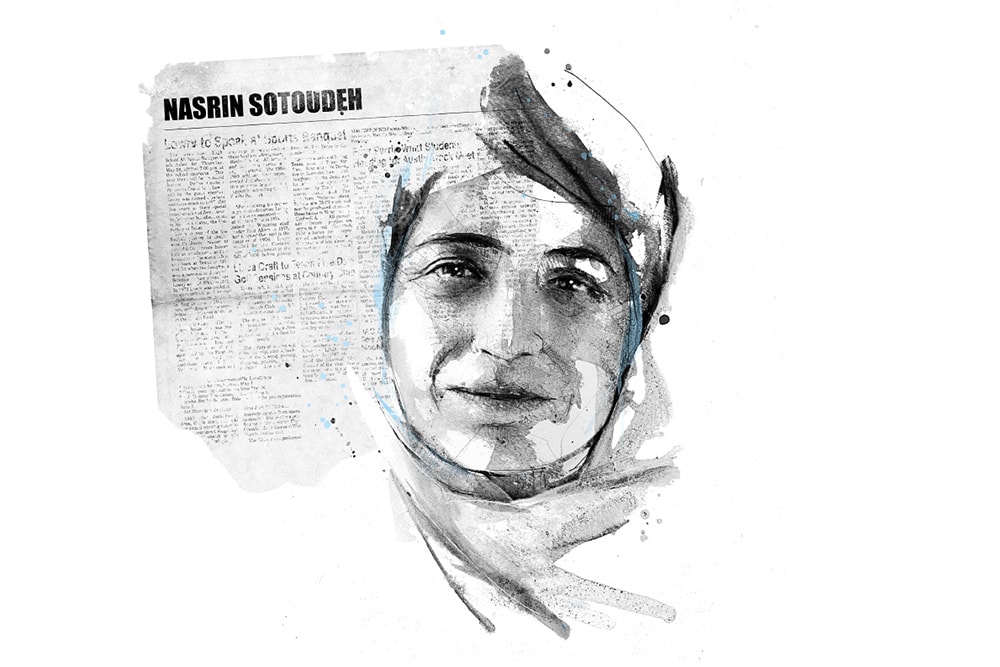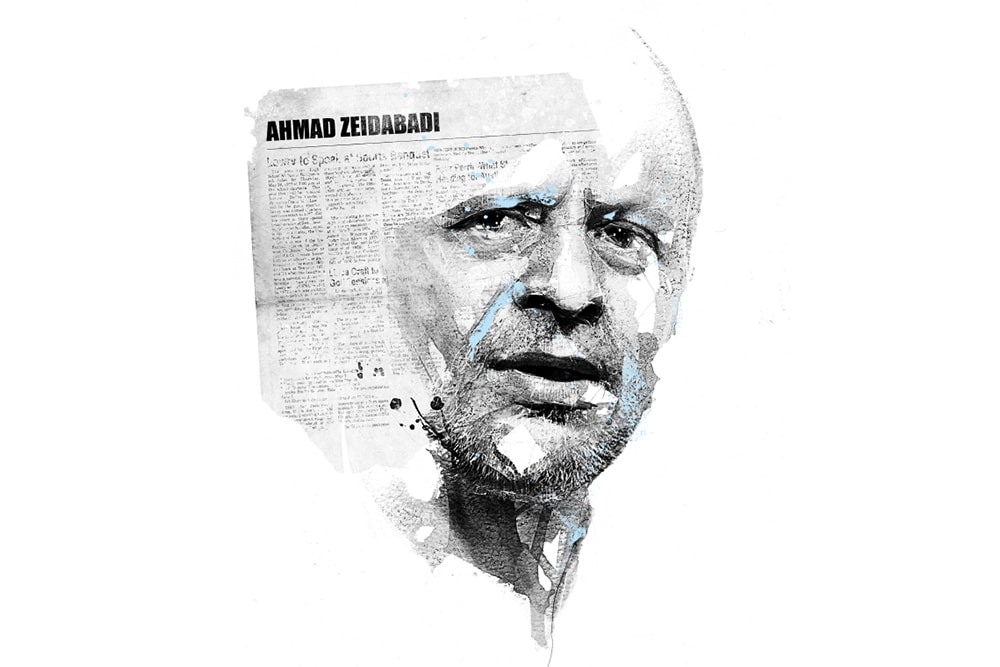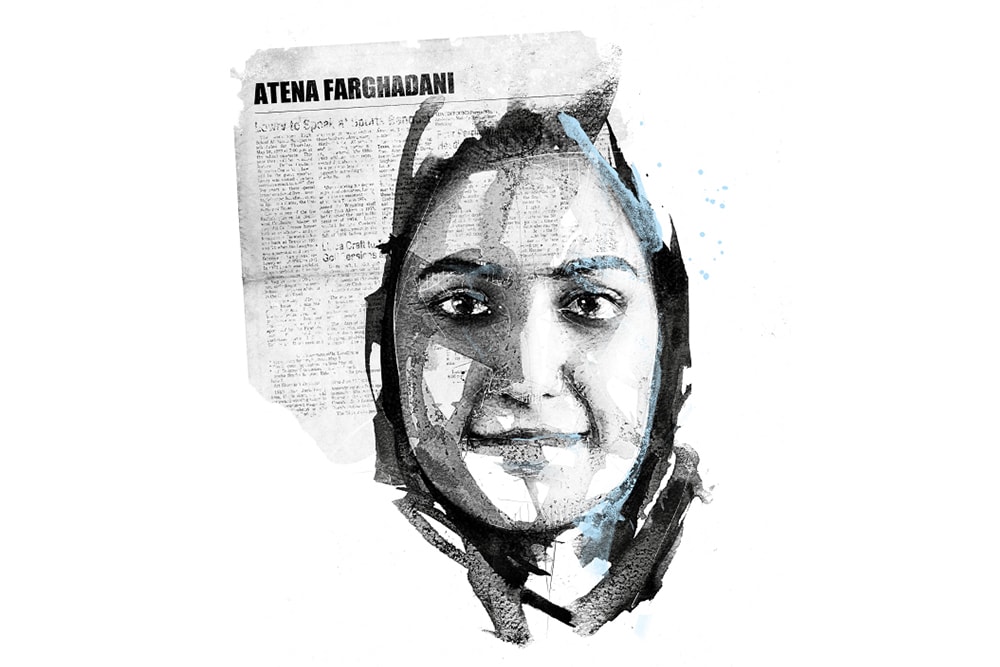Fearless and outspoken, Nasrin Sotoudeh is one of Iran's most well-known human rights defenders. Harassed by the authorities for years, in 2019 Sotoudeh was sentenced to 38 years in prison and 148 lashes.
In a letter she wrote to her daughter from prison in 2010, Nasrin Sotoudeh wrote: "Justice arrives exactly at a time when most have given up hope. It arrives when we least expect it. I am certain of it."
Over the years, Sotoudeh has defended a range of activists including students, journalists and dissidents. She has also worked on behalf of child prisoners convicted of murder and facing execution. Among her high profile clients is Shirin Ebadi, a Nobel Peace Prize laureate who is now in exile.
In January 2011, Sotoudeh was sentenced to eleven years in prison: one year for ‘propaganda against the regime’ and ten years for ‘acting against national security’ and ‘violating the Islamic dress code (Hija) in a filmed speech’. She was charged for giving interviews to the international media in the aftermath of protests against the disputed presidential election in June 2009. She was also barred from practising law and not allowed to leave the country for 20 years. The sentence and the ban on her working as a lawyer was later reduced on appeal to six years.
Sotoudeh had been arrested four months earlier, in September 2010, after police raided her home. She was taken to the notorious Evin Prison in Tehran. Contact with her lawyer, husband and children were severely limited. She spent three months in solitary confinement, not even allowed photos of her family, according to Amnesty International. When she learned that her 12-year-old daughter had been banned from travelling abroad, Sotoudeh went on hunger strike demanding her rights to meet with her family, and for an end to their harassment. She went on hunger strike four more times while she was in jail.
In September 2013, three years into her sentence, she was unexpectedly freed. Soon after, she returned to activism, and has been harassed and briefly detained multiple times since. In October 2014, she was among a group of people arrested at a protest outside the Ministry of Interior in Tehran against a spate of acid attacks on women in Isfahan who were left scarred and blinded by their assailants.
A month after her release, the Iranian Bar Association issued a ban against her practising for three years. Denying it had been pressured by the government, the Association cited her 2010 conviction as the reason. Incensed, Sotoudeh started a picket campaign outside the Association’s office, garnering support from other political activists despite facing harassment.
Sotoudeh graduated in law in 1995. Not being able to practice until 2003, she took up journalism in the interim, writing on women’s and children’s rights and contributing to numerous reformist publications. She continues to write. In April 2011, she was granted the PEN American Centre’s PEN/Barbara Goldsmith Freedom to Write Award. As Sotoudeh was still in prison and unable to accept it in person, Shirin Ebadi received the award on her behalf. In October 2012 Sotoudeh was co-awarded the European Parliament’s Sakharov Prize, alongside film-maker Jafar Panahi who has defied a 20-year ban on making films. His internationally acclaimed film Taxi, released in 2015, is filmed entirely in Tehran taxis where passengers discuss politics on camera. Nasrin Sotoudeh is one of them.
On 13 June 2018, Sotoudeh was arrested by security forces on a complaint filed by a judicial official in Kashan, reportedly due to her “legally representing Shaparak Shajarizadeh, who has been charged for peacefully protesting against Iran’s compulsory hijab law.” On 11 March 2019, her husband announced that she has been sentenced to 38 years in prison and 148 lashes “for her legal defense of women involved in protests against the compulsory hijab”.
ARTICLE 19 described it as “one of the harshest punishments the country has ever doled out to a human rights defender and lawyer, and represents a new low for the country’s repressive judiciary.”
Imprisoned in Iran’s notorious Evin prison, Sotoudeh launched a hunger strike in March 2020 along with other political prisoners to protest their mistreatment and continued detainment in overcrowded cells amidst the COVID-19 pandemic. Iran released thousands of prisoners in response to coronavirus outbreaks throughout its prisons, but continued to deny prisoners of conscience like Sotoudeh their freedom. According to IFEX member Gulf Centre for Human Rights, Sotoudeh’s health has suffered greatly as a result of medical neglect, and successive hunger strikes.
In an apparent reprisal, authorities arrested her 20-year old daughter, Mehraveh Khandan, on 18 August 2020, with the Evin prison court charging her with assaulting a female security officer. Khandan was released on bail but must defend herself in an ongoing case seen as part of an effort to silence political prisoners by intimidating their families.
In October 2020, Sotoudeh was moved to the overcrowded Qarchak women prison despite her severe health situation. After being granted temporary medical leave on 7 November 2020, she tested positive for COVID-19 five days later, extending her furlough another three weeks. Sotoudeh was brought back to prison on 2 December 2020 – on the eve of the Right Livelihood Awards, for which she is one of four laureates in 2020. “Such unprecedented global support makes it unnecessary for me to explain to my children why it is that their mother has been in prison since they were very young,” said Sotoudeh in an audio recording presented at the award ceremony.
In July 2021, Sotoudeh was granted another temporary medical furlough from prison, and continued to speak up for the rights of women and minorities in the country, and globally.
In an interview shortly after widespread protests erupted in September 2022 over the killing of a 22-year old Iranian-Kurdish woman Mahsa Jhini Amini, Sotoudeh said: “I in no way see a return to the past, no matter the nature of the crackdown. Even if the people’s demands are not met, the reality will have shifted permanently. They will not tolerate the compulsory veil any more.”
In October 2023, Sotoudeh was violently rearrested along with other mourners attending the funeral of Armita Garavand, a 16-year-old girl who died following being beaten by Iran’s morality police for not wearing a hijab in public. She spent 17 days detained on charges for violating the mandatory veiling laws at the funeral. She began a hunger strike to protest her unjust detention and was later released on bail.
Since her imprisonment, the human rights defender has also been awarded the Human Rights Award by the Council of Bars and Law Societies of Europe, and bestowed with an honorary doctorate from Queen’s University in Canada. In November 2022, she was named the inaugural recipient of the Robert-Badinter Prize for her dedication to human rights and the eradication of the death sentence. Sotoudeh is also featured in a 2020 documentary about her life and work. Narrated by Academy Award Winner Olivia Colmman, it was filmed mostly secretly in Tehran.
Illustration by Florian Nicolle


